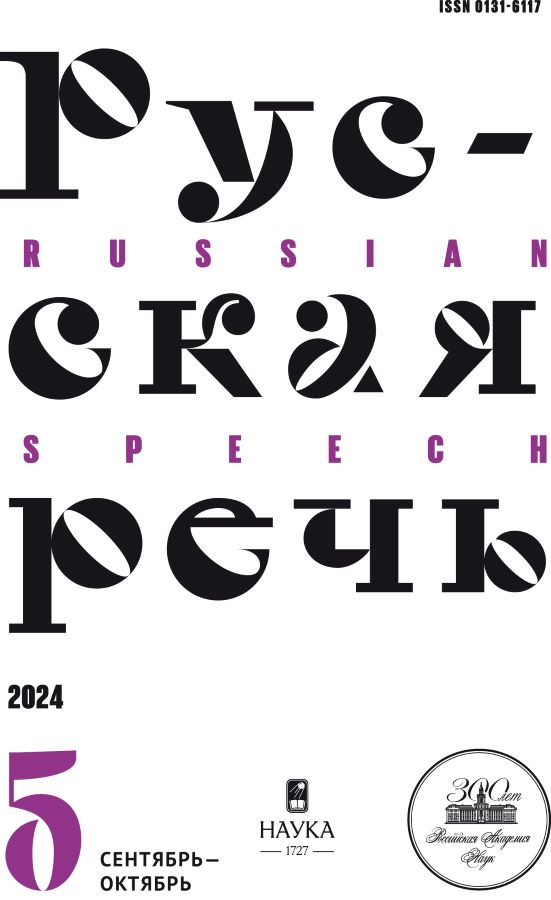The polysemy of the lexeme “bread” and its functioning in the Russian folk riddle
- Authors: Meshcheryakova O.A.1, Turko U.I.2
-
Affiliations:
- Pushkin Leningrad State University
- Bunin Yelets State University
- Issue: No 5 (2024)
- Pages: 84-95
- Section: The Language of Fiction
- URL: https://freezetech.ru/0131-6117/article/view/652405
- DOI: https://doi.org/10.31857/S0131611724050079
- ID: 652405
Abstract
In this article, the authors examine the polysemy of the lexeme bread, which can be found in a Russian folk riddle. The proverbs recorded in the collection “Riddles” prepared by V. V. Mitrofanova served as a material for the analysis. The paper analyzes the uses of the polysemantic lexeme bread both in the answer and in the text of the riddle itself.
The designation of the original denotation using the lexeme bread is based on the denotative meaning, while the most popular are two main lexical-semantic options: ‘a food product baked from flour’; ‘grains (rye, wheat, etc.)’. The polysemy of the word influences the division of the riddles with the answer bread according to thematic content into two sections of the collection: “Food, drink”, “Arable land, mowing, sowing and processing of bread”.
In the question part of the lexeme, bread is used both in literal and figurative meaning. The derived meaning that arises on the basis of the metaphor is due to associative features that are not semantically essential for ideas about bread. The lexical ambiguity of the word bread serves as a linguistic means of realizing the playful nature of the riddle process.
The peculiarities of the use of lexical-semantic variants of the lexeme bread in the question and answer parts indicate that polysemy is a genre-forming property of this type of proverb.
Full Text
About the authors
Olga A. Meshcheryakova
Pushkin Leningrad State University
Author for correspondence.
Email: lameo56@yandex.ru
Russian Federation, Leningrad region
Ulyana I. Turko
Bunin Yelets State University
Email: selishchevskaya@mail.ru
Russian Federation, Yelets
References
- Apresyan Yu. D. Izbrannye trudy. Tom II. Integral'noe opisanie yazyka i sistemnaya leksikografiya [Selected works. Volume II. Integral description of the language and systemic lexicography]. Moscow, Shcool “Yazyki Slavianskoi Kul’tury” Publ., 1995. 767 p.
- Glyants M., Pimenova M. A., Potapenko V. V. [The role of the Russian stove in the life of the Eastern Slavs]. Natsional'nye prioritety Rossii, 2017, no. 5 (27), pp. 30–36. (In Russ.)
- Golovanova E. I., Golovanov I. A., Kazachuk I. G. [Language picture of the world vs. folklore picture of the world: points of common ground and differences]. Nauchnyi dialog, 2016, no. 8 (56), pp. 34–45. (In Russ.)
- Khlebnye traditsii — Khlebnye traditsii i obychai Slavyan [Bread traditions — Bread traditions and customs of the Slavs]. Available at: https://sladik.net/prokhleb/prokhleb-traditsii-slavyan.php (accessed: 27.08.2024).
- Kovshova M. L., Orlova O. S. [On the question of the semantic structure of the riddle: cognitive and cultural commentary as a principle of research]. Tul'skii nauchnyi vestnik. Seriya Istoriya. Yazykoznanie, 2020, no. 4 (4), pp. 70–79. (In Russ.)
- Kuznetsov S. A. (ed.). Bol’shoi tolkovyi slovar’ russkogo yazyka [Big dictionary of Russian language]. St. Petersburg, Norint Publ., 2000. 1536 p.
- Lyapin D. A. Puteshestviya v proshloe: ocherki etnografii Verkhnego Podon'ya [Travels to the past: essays on the ethnography of the Upper Don region]. Kemerovo, Asia-Print Publ., 2014. 144 p.
- Novikov L. A. [Semantic structure of a word]. Russkii yazyk: Entsiklopediya [Russian language. Encyclopedia]. Moscow, Scientific publishing house “Great Russian Encyclopedia”, Drofa Publ., 1997, pp. 455–457. (In Russ.)
- Shmelev D. N. [Polysemy]. Russkii yazyk: Entsiklopediya [Russian language. Encyclopedia]. Moscow, Scientific publishing house “Great Russian Encyclopedia”, Drofa Publ., 1997, p. 352. (In Russ.)
- Soldaeva A. A. Intertekstual'nost' russkoi traditsionnoi zagadki: lingvisticheskii aspekt. Avtoref. dis. ... kand. filol. nauk [Intertextuality of the Russian traditional riddle: linguistic aspect. Cand. phil. sci. diss. abstr.]. St. Petersburg, 2018. 25 p.
- Tolstaya S. M. [Bread]. Slavyanskie drevnosti: Etnolingvisticheskii slovar' v 5-ti t. T. 5: S (Skazka) — Ya (Yashcheritsa) [Slavic antiquities: Ethnolinguistic dictionary in 5 volumes. V. 5: S (Skazka) — Ya (Yashcheritsa)]. Moscow, Mezhdunarodnye Otnosheniya Publ., 2012, pp. 412–421. (In Russ.)










